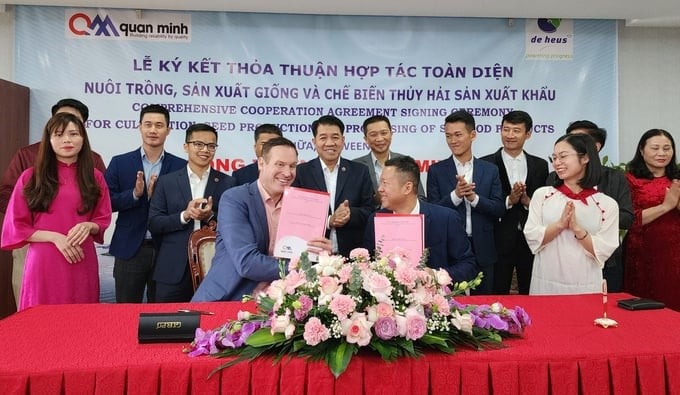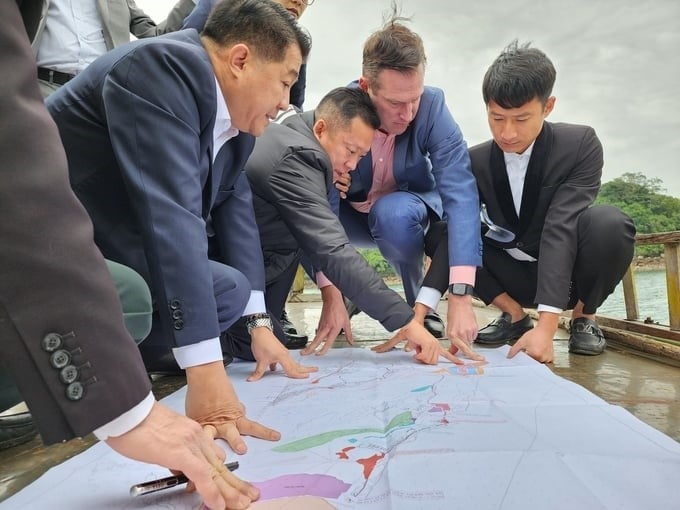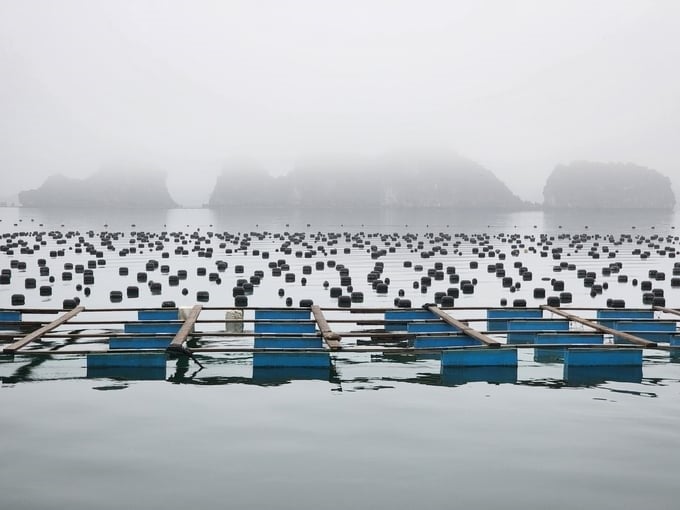June 8, 2025 | 18:38 GMT +7
June 8, 2025 | 18:38 GMT +7
Hotline: 0913.378.918
June 8, 2025 | 18:38 GMT +7
Hotline: 0913.378.918

Representatives of the two businesses signed a comprehensive cooperation agreement on the cultivation, seed production, and processing of seafood products. Photo: Cuong Vu.
On March 20, in Van Don district, Quan Minh Co., Ltd. and De Heus Group held a comprehensive cooperation agreement signing ceremony for cultivation, seed production, and processing of seafood products.
De Heus belongs to the Netherlands’ De Heus Group, established in Vietnam at the end of 2008 and specializing in producing high-quality animal feed for cattle, poultry, and seafood. It currently has more than 20 factories and a transit warehouse system operating throughout the country.
At the signing ceremony, the two sides agreed to coordinate on researching and developing models for cultivating and producing aquatic varieties, as well as processing and trading seafood products.
At the same time, coordinate on researching and producing high-yield and high-quality aquatic seeds, with a capacity of about 5–6 billion mollusks per year. Research and search for domestic and foreign markets to consume products.

Director of Quan Minh Company and Mr. Gabor Fluit, General Director of De Heus Asia, are researching aquaculture sites in Van Don. Photo: Cuong Vu.
Quan Minh Co., Ltd. and De Heus will coordinate to seek investment capital to support the development of farms, aquaculture businesses, and consumption agents. This coordination also aims to build a closed chain of processing, purchasing, preserving, consuming, and exporting seafood products.
Of which, in Quang Ninh, Quan Minh Co., Ltd. acts as a focal point linking with affiliated companies and cooperatives in the Van Don ecosystem, including Tan Lap Trading Co., Ltd., Van Don Trading Co., Ltd., Manh Duc Cooperative, Trong Vinh Cooperative, Truong An Cooperative, and Truong Giang Cooperative, to build a closed chain of producing, purchasing, preserving, consuming, and exporting seafood products on a large scale and an area of 2,000 hectares in Van Yen, Quan Lan, and Minh Chau communes.
Thereby contributing to the effective exploitation of the water surface for aquaculture, creating jobs, and forming a linkage chain in the cultivation, production, processing, and export of seafood products in the province.
At the working session, Mr. Hoang Van Cuong, Director of Quan Minh Co., Ltd., said that reducing the exploitation of wild seafood and increasing aquaculture at sea is a solution to help balance human needs with aquatic resource conservation and sustainable development. Therefore, converting to marine farming, developing industrial farming scale, aiming for export, and improving the quality and value of seafood products will be an inevitable trend.
Quang Ninh is one of the localities that possesses many available strengths to develop the ocean economy and seafood products, with more than 2,000 large and small islands, a coastline 250 km long stretching from Mong Cai to Quang Yen, 40,000 ha of tidal flats, over 20,000 ha of straits, bays, etc.
"Van Don has many advantages in terms of location, terrain, water surface area, etc., for aquaculture. However, at the present time, the development of this industry is still not commensurate with its inherent potential; efficiency is not high; and the industry needs more systematic investment," Mr. Cuong commented.

In Van Don, oyster farming is developing strongly. Photo: Cuong Vu.
According to Mr. Cuong, Van Don's ocean economic development orientation will rearrange farming areas in the direction of reducing farming density in sea areas from 3 nautical miles or less, and developing industrial farming areas with modern technology suitable for environmental carrying capacity within the limit of 3–6 nautical miles.
In addition, to limit negative effects on the marine ecological environment, Van Don is gradually converting from traditional, near-shore cage and raft farming to off-shore, high-tech farming with climate change adaptation. At the same time, strengthen linkages in aquaculture production along the value chain towards improving production value efficiency and sustainable development.
"We will promote the development and expansion of aquaculture and diversify marine species. Of which, focus on developing specialty species with high economic value and key species such as garrupa, oyster, clam, geoduck, pearl oyster, mud clam, etc.," said Mr. Cuong.
In Quang Ninh, aquaculture is a strength that makes an important contribution to the growth of the agriculture sector. In 2024, the agriculture sector is determined to boost farming output. As of now, the entire Quang Ninh province has 45,246 ha of water surface in nine coastal localities planned for marine farming and integrated into the province's planning. Of which, the sea area within an area of 3 nautical miles is 23,975 ha; the sea area from 3 to 6 nautical miles is 13,031 ha; and the sea area beyond 6 nautical miles is 8,240 ha.
Translated by Huyen Vu Thu
/2025/06/05/5314-1-184727_407.jpg)
(VAN) From seemingly worthless fish scales and skin, enzymes and lactic ferments can transform by-products into peptides, opening a sustainable, effective business direction and elevating Vietnamese seafood.

(VAN) TTC AgriS and IFC signed a strategic partnership to develop a sustainable agricultural value chain, aiming to achieve the Net Zero target by 2035.

(VAN) Seafood by-products are opening a new path, combining green growth and technological innovation to enhance the industry's value.

(VAN) Mr. Nguyen Thanh Cong, Vice Chairman of the Son La Provincial People's Committee, reflects on Son La’s journey from barren hills to fruitful orchards after a decade of hard work.

(VAN) FAO’s Director-General addresses the 5th Baghdad International Water Conference.
/2025/05/26/1716-4-nongnghiep-191706.jpg)
(VAN) Chain linkages, technological innovation, and raw material zoning are three strategic pillars for the coconut industry to strongly develop and elevate its position on the global agricultural map.
![Advanced mariculture – an inevitable trend: [4] Accompanied by scientists](https://t.ex-cdn.com/nongnghiepmoitruong.vn/608w/files/sohk/2025/05/13/1941-pgsts-vo-van-nha-140958_717.jpg)
(VAN) According to Assoc. Prof. Dr. Vo Van Nha, Director of the RIA III, the development of advanced offshore mariculture is no longer an option but an essential path for Vietnam’s fisheries sector.